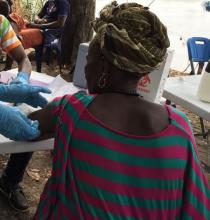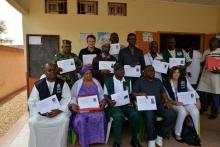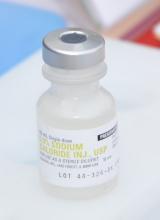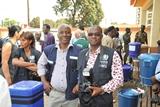First Ebola Vaccine to Be Tested in Affected Communities One Year into Outbreak Ring Vaccination Starts in Coyah, Guinea
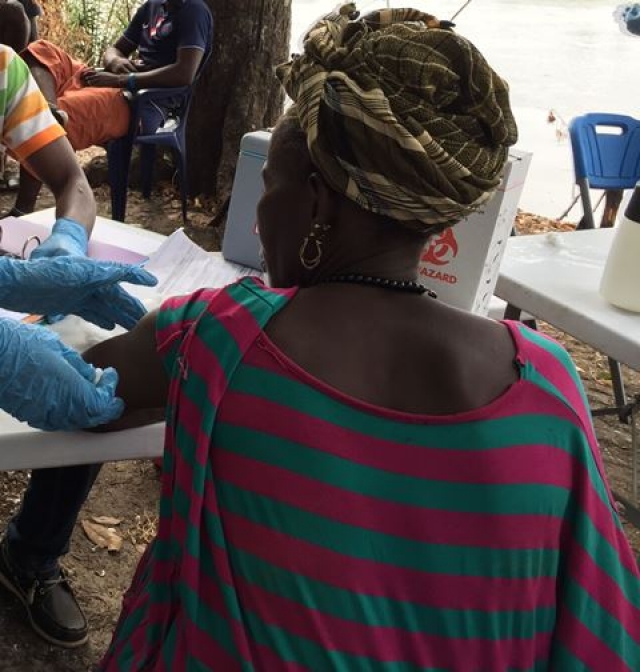 Conakry, 25 March, 2015 – The Guinean Government with the World Health Organization (WHO) initiated the very first efficacy trial of an Ebola vaccine this week in an affected community of the Basse-Guinée, one of the areas where most Ebola cases are found in the country. Ring vaccination tests of VSV-EBOV, a lead Ebola vaccine developed by the Public Health Agency of Canada, received an excellent response from the community in a small village in the Coyah prefecture, where the trial team arrived on 23 March.
Conakry, 25 March, 2015 – The Guinean Government with the World Health Organization (WHO) initiated the very first efficacy trial of an Ebola vaccine this week in an affected community of the Basse-Guinée, one of the areas where most Ebola cases are found in the country. Ring vaccination tests of VSV-EBOV, a lead Ebola vaccine developed by the Public Health Agency of Canada, received an excellent response from the community in a small village in the Coyah prefecture, where the trial team arrived on 23 March.
“This landmark operation gives hope to all of us, in Guinea and in the world, that we might soon have an effective public health tool against Ebola, should the vaccine prove to be safe and effective,” stated the WHO Representative in Guinea, Dr. Jean-Marie Dangou. “The start of ring vaccination clinical testing today in Guinea is therefore one of the most important milestones we have achieved in seeking a modern line of defense against Ebola.”
Trained medical staff, vaccines and other essential equipment were dispatched from Conakry to Coyah to vaccinate contacts of recently infected people who have given consent in a village of the Coyah prefecture. Vaccinations for now will include only adults, who are most at risk of infection, with the exception of pregnant women.
"We are committed to ending this epidemic,” said Dr. Sakoba Keita, National Coordinator of the Fight against Ebola in Guinea. “Combined with control measures that we are putting in place with our partners, a safe and effective vaccine will allow us to close this trying chapter and start rebuilding our country."
The ring vaccination strategy consists in identifying recently infected patients and vaccinating all their contacts, thereby creating a ‘ring of immunity’ around them to stop the virus from spreading.
“This very same strategy was a key contribution to eradicating smallpox in the 1970’s, and allows us to vaccinate all those at greatest risk," explained WHO Coordinator for the Guinea Vaccine Trial, Dr. Ana Maria Henao Restrepo.
Dr. Bertrand Draguez, Medical Director for the Non-governmental Organization Médecins sans Frontières (MSF) stressed that: “The trial is organized on a voluntary basis, and participation is confidential, free and non-remunerated.”
The Guinean Government is fully committed to the success of the vaccine clinical trial. In a 20 March official letter addressed to all the Mayors, Prefects and local Health Officials in Guinea, the Head of the National Coordination Against Ebola in Guinea, Dr Sakoba Keita, asked all local public actors for their full cooperation and support.
A total of around 10 000 people are planned to be vaccinated in 190 rings within a six-eight week period. Volunteers will be followed for three months. Results could be available as early as July 2015.
____________________________________________________
Note to editors
About the vaccine and the vaccination strategy:
VSV-EBOV Vaccine was developed by the Public Health Agency of Canada. The vaccine was licensed to NewLink Genetics, and on November 24, 2014, NewLink Genetics and Merck announced their collaboration on the vaccine.
The concept of ring vaccination applied to the Guinea Ebola vaccine clinical trial is based on vaccinating the “rings” (group of contacts of a newly diagnosed Ebola “index case”) either immediately after confirmation of the Ebola diagnosis of the “index case”, or three weeks later (delayed vaccination). This strategy allows all the known contacts to be vaccinated within a short period of time, and it constitutes an excellent alternative to the use of a placebo. The ring vaccination trial design was developed by an international group of experts from Canada, France, Guinea, Norway, Switzerland, United Kingdom, United States, and WHO. This group included Professor Donald A. Henderson, who led the WHO smallpox eradication effort.
The Guinea Ebola vaccine trial is a coordinated effort among numerous international partners. The trial is implemented under the responsibility of the Guinean government. The World Health Organization (WHO) is the sponsor of the study. The Government of Guinea, Doctors without Borders / Medecins sans Frontières (MSF), Epicentre, the Norwegian Institute of Public Health and WHO are coordinating its implementation. The trial is funded by MSF; the Research Council of Norway through the Norwegian Institute of Public Health; the Canadian government through the Public Health Agency of Canada, Canadian Institutes of Health Research, International Development Research Centre and Department of Foreign Affairs, Trade and Development; and WHO, with support from the Wellcome Trust, United Kingdom.
___________________________________________________
For more information, please contact:
Pr Jean-Marie DANGOU, WHO Representative to Guinea
Cel : + 224 623 23 55 55
E-mail: dangouj [at] who.int (dangouj[at]who[dot]int)
Dr Ana Maria Henao Restrepo
E-mail : henaorestrepoa [at] who.int (henaorestrepoa[at]who[dot]int)
M. Konaté Issiaga
Tel : +224 62 59 70 42
E-mail: konatei [at] who.int (konatei[at]who[dot]int)
Rodrigue Barry
E-mail : barryr [at] who.int (barryr[at]who[dot]int)
Tel : +224 624 827 240
Koné Souleymane
Email : koneso [at] who.int (koneso[at]who[dot]int)
Tel : +224 624 827 337
Mbengue Khalifa
Tel : +224 624 827 350
Email: mbenguek [at] who.int (mbenguek[at]who[dot]int)



